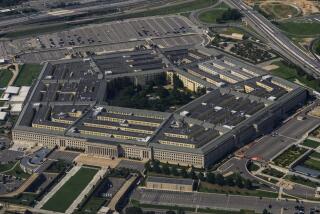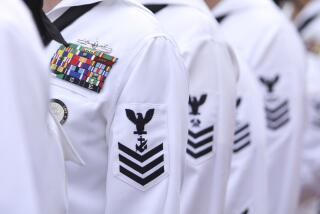Marines Set Aside Go-It-Alone Attitude
- Share via
CAMP PENDLETON — When Americans think of the U.S. military’s elite, Army Rangers and Navy SEALs come to mind--not the Marine Corps’ Force Reconnaissance.
That could change with a decision by the Marine Corps to drop what some saw as organizational aloofness and join the other military services in coordinating special warfare operations.
In another sign that the war on terrorism is reshaping the U.S. military, officials from the Marine Corps and the U.S. Special Operations Command recently met to discuss how Force Recon and other Marines trained in special operations can help as the war enters its next phase.
Before Sept. 11, the Marine Corps had largely remained unconnected to SOCOM, the control center in Tampa, Fla., that Congress established in 1987 to handle special operations planning and reduce interservice rivalry. The Marines have been the only service not to commit troops to SOCOM.
But the war in Afghanistan--and Marine Commandant Gen. James L. Jones Jr.’s desire to bolster Force Recon and the Marines’ other special operations units--led to a change that was unthinkable until recently.
Jones, whose father commanded an amphibious reconnaissance company in World War II, is considering organizing a reconnaissance unit specifically for SOCOM, a major commitment for an organization such as the Marine Corps with an unusually small budget and a go-it-alone ethos.
Retired Col. Fred Peck said the commitment to SOCOM shows the Marine Corps is moving away from its historic aversion to getting involved in operations with other services.
“The conventional wisdom used to be: If we carve out our own unique niche, then we won’t have to engage in turf wars with our much larger service brothers,” Peck said. “Jumping into the joint arena was greatly feared [by Marine brass] for a long while.”
Like other military planners, Jones believes the war on terrorism will be fought less by massive headlong assaults and more by small units that can move quickly, conduct surveillance and intelligence-gathering, then apply firepower in concentrated bursts.
“‘The Sands of Iwo Jima’ is a great movie, but it doesn’t reflect the reality of how we will fight in the future,” Jones said.
Experts say the Marines have already adroitly adapted to the new kind of warfare that emphasizes joint operations.
“The Marines see a [need] for fast, light, mobile units that they believe they can fill quickly because it suits who they already are,” said Charles Pena, senior defense policy analyst at the Cato Institute, a Washington-based Libertarian think tank.
“The last thing the Marines want is to be left on the bench in the next war,” Pena added.
Overshadowed by their more publicized counterparts in the Army and Navy, the Marine Corps’ equivalent of special forces got little notice in the weeks preceding the Oct. 7 start of the U.S. offensive in Afghanistan--even though special operations Marines from Camp Pendleton and Camp Lejeune, N.C., were already on ships in the Arabian Sea and in secret bases in Pakistan.
With about 800 personnel, the Marines’ special operation force is the smallest of the military’s special forces units. The Navy has about 4,500 such personnel and the Army about 25,000.
Formed during World War II, Force Recon is trained for most of the same missions as Navy SEALs and Army Special Forces, although they are not taught to rescue hostages or work with “indigenous” forces such as the Afghan resistance fighters.
Force Recon is only the core of the Marines’ special operations capability. When they deploy, they are supplemented by other combat Marines who have received special training.
If the Marines were overlooked in the media buildup to the Afghan offensive, it may have been their own fault.
Force Recon and other special operations-trained Marines have never received the self-promotion that the Navy lavishes on its SEALs or the Army on its Green Berets and Rangers. It is both a source of pride and annoyance to Marines.
“Relatively unknown outside of the Department of Defense, they neither seek nor suffer the publicity of others in the business,” says a Web site organized by former Force Recon Marines.
Author Tom Clancy barely mentions the Marines in his new book, “Shadow Warriors: Inside the Special Forces,” written with former SOCOM commander Carl Stiner.
One problem for the Marine Corps may begin with its vocabulary: It avoids the term “special forces,” which has become a media buzz phrase. Another problem is cultural: Marines tend to downplay any suggestion of elitism within their ranks.
“The Marine Corps has a lot of aspects that are deeply deadly,” said Capt. Anthony Bolden, operations officer with Force Recon at Camp Pendleton. “We’re just one of them.”
Along with the new SOCOM partnership, the Marines also are seeking to boost the appeal of Force Recon within its ranks by changing their rules to allow enlisted personnel to make a career in a reconnaissance unit. Until now, enlisted Marines had to leave the unit to get promoted beyond a midgrade level, which led to turnover and loss of continuity.
In Afghanistan, a Force Recon unit from Camp Pendleton organized “hunter-killer” teams in early December to block Taliban and Al Qaeda forces from fleeing the battle at Kandahar, the kind of mission that might have gone to an Army Special Forces unit.
Before they left the outpost dubbed Camp Rhino, the Marines got a lecture from Brig. Gen. James Mattis.
“The first time they [Taliban and Al Qaeda] run into U.S. Marines, I want it to be the most traumatic experience of their miserable lives,” Mattis told his Marines. “I want them to fear us and never want to engage us again.”
Within hours, Force Recon had entered into a point-blank firefight under the pitch-black Central Asia sky, leaving eight enemy dead along a stretch of road known as Route 1. An airstrike killed dozens more. Taliban and Al Qaeda forces never again tried to use that strip of road.
Army Gen. Tommy Franks, commander of U.S. troops in Afghanistan, sent the Marines a note saying their prowess as a “power projection strike force was superbly demonstrated” on Route 1.
“It’s such an obviously good thing for the nation,” Jones said of the new ties between the corps and SOCOM, “and for the Marine Corps.”
More to Read
Sign up for Essential California
The most important California stories and recommendations in your inbox every morning.
You may occasionally receive promotional content from the Los Angeles Times.













